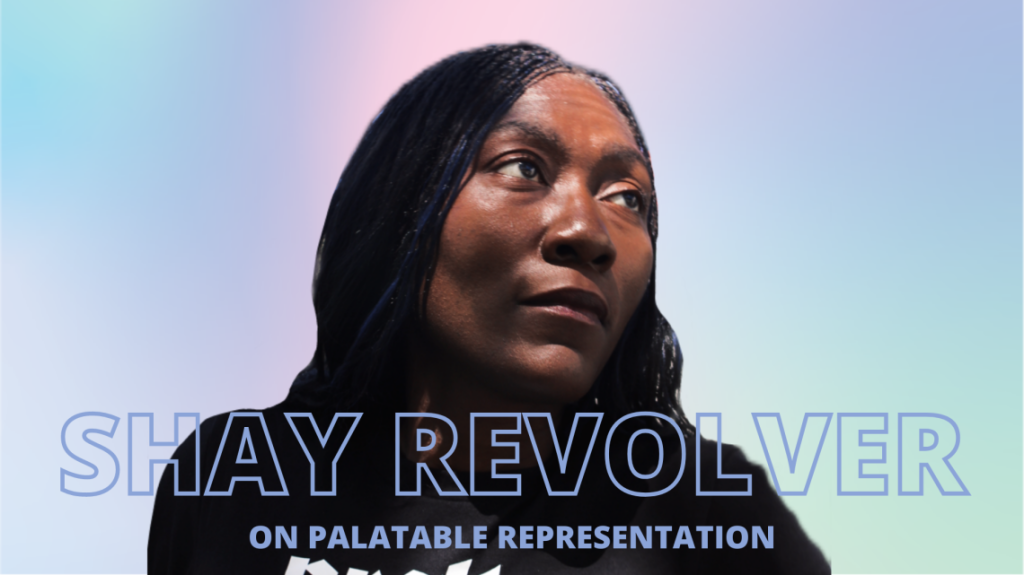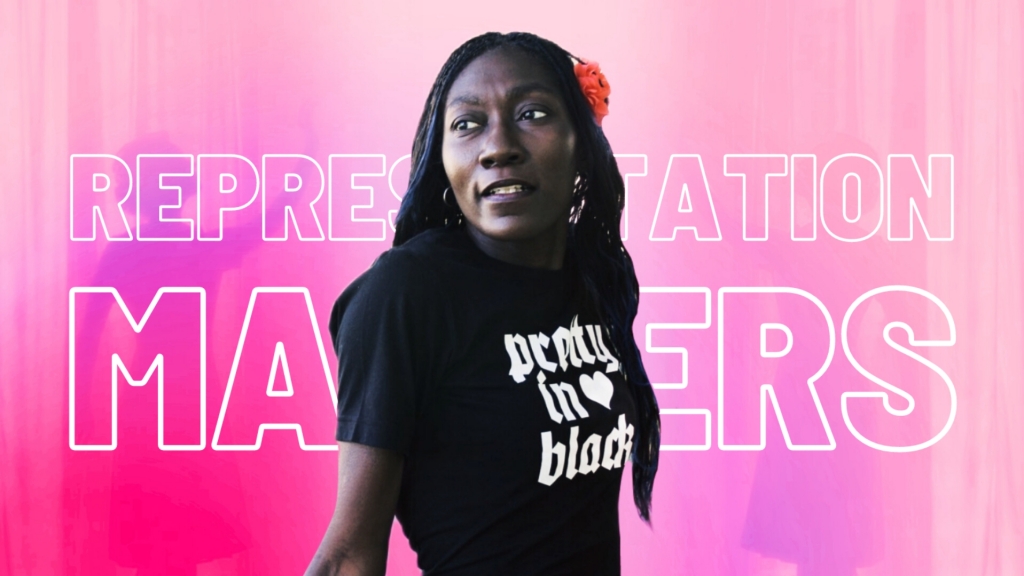Written by Malin Evita.
Shay Revolver is a feminist filmmaker whose shorts and web series have been screened at several film festivals. She has also started Bad Habit Films—a microbudget production company that is not waiting for permission. They shoot everything from shorts, shows, and music videos committed to showcasing a diverse range of stories—made by a diverse range of people—that have not been told before. This piece is part two of our three-part series with her—read part one On Palatable Representation here.
“My mom originally went to college because she wanted to be an actress, and she, once she started going out for roles, discovered that all that she would ever get cast for would be a maid.” Shay Revolver recollects, remembering back to the local New Jersey theatre productions her mother, Bessie, would perform in when she was young. “She has this one monologue where she recites the entire creation from the Bible that literally will make you cry. I can tell she really loves being on stage.”
There was one play where Shay remembers her mother being praised with a standing ovation after an exquisite performance, and all she could wonder was why? Why didn’t she ever become an actress? “And she said, Because [for] every role in the 1950s, I was going to be a maid. Or I was going to be a cleaning lady. Or I was not gonna speak English.” Shay says. Bessie came from a “great family”. She was classy and well-educated, went to college at sixteen (which Shay also raced to do, attempting to even one-up her by staying sixteen in her first full year studying). But even then, the industry didn’t want her as more than a demeaning background character, and she wasn’t going to let them have that. So she stopped.
“Seeing this person who could have been an amazing actress—she could have had a great career. If you’re from our town in Jersey, you’ve heard her do it, and people have paid to see her do it because she’s that good at it,” Shay marvels, “I remember watching her growing up, being so proud of her because she looked happiest when she was performing. Then you find out at ten that, Oh yeah, I gave up because I didn’t want to demean myself.”

How Stereotypes Fuel a Cycle of Prejudice
“Representation matters so much.”
Growing up, Shay was told that she spoke ‘funny’. “ I’ve been in private school my entire life, and I didn’t realise that I talked any different than anybody else. I talked the same as the ones I grew up with.” But, she adds, because of how Black people are often portrayed in movies and TV-shows, people around her expected her to sound differently. “We don’t all talk the same. That would be like saying someone from New York has the same accent as someone from Atlanta. And it only comes into play when talking about minority cast members!”
These assumptions about her voice, being, and experiences as a Black American woman especially followed her around in the beginning of her filmmaking career, where producers and execs were hungry for her to make movies about ‘The Black Experience.’ AKA—in their eyes—”hood movies” about drugs and gangs. Stereotypical, lazy, and trope-filled stories that we have seen played out on the big screen for decades.

“I am forty-two. I have been watching movies since I was four. I have had thirty-eight years of seeing nothing!” She scoffs, “My mom and dad they would take me to watch films that were supposed to be diverse, and I will never forget [how] every single movie in the eighties and early nineties that involved Black people where always They live in the projects, and they’re in a gang. And I’m sitting here like, I don’t recognise myself in that. The problem is that when creating characters for women and for people of color, [white filmmakers] tend to think that everyone is exactly the same, and they write as if we are a monolith.”
Throughout her career, she has watched as the cycle continues to feed itself. Some of the moments that particularly stand out to her include a casting session she sat in on as a production assistant where one of the casting directors asked a Hispanic actress to put on an “ethnic” accent. Then there was when a young, nineteen-year-old actress told her about how she had been coerced into wearing revealing clothes on set. And each time she encounters these (much too frequent) occurrences, her mother’s story flares up in the back of her mind, fueling her fire to reach a level of influence where she can at least break this cycle on her own sets and inspire the same change in others.
Become the Change
“I, by the time I got to thirty, had a list of shit that I was like, I don’t care if I have self-fund and crowdfund for every project I do – there is gonna be at least one film every year that comes out where this is not happening. Because it is not okay.”
These experiences have become the foundation for the rules she now applies to her own work. She will never cast people of colour as maids, nor criminals or gang members or any of the other sloppy, racist caricatures that white filmmakers have recycled for decades. “I just refused to cast people of color in those roles because I remember how much it hurt my mom.”
“To this day, [my mom is] like, Yeah, It’s not gonna change, honey. And as much as I do it for other women and girls who have been told No, you can’t. I also do it because I want my mom to, hopefully, before she goes – which hopefully isn’t for a long time—to see, Look mom, there’s a change—we don’t have to be maids anymore. We don’t have to do this anymore!”
“So I do it for the actress who is seventeen, eighteen, nineteen, twenty years old. Who is only going to run into male directors, male producers, and male this and male that, for the next ten years of her career. Who is gonna quit acting even though she is amazing at it, because she’s either gonna be portrayed as a bimbo—because that wears on you and you don’t feel like you can say no—or, you can write something where someone is not being stereotyped. Where every girl isn’t the bimbo, isn’t the slut. Where every Black person isn’t a drug dealer. Where every Hispanic person isn’t stealing cars. Where every Asian person isn’t doing math…


“As women, we have to keep going because trust me, there is an actress out there who is about to step onto her first set, and she is going to have the worst experience of her life. She’s going to keep trying until she quits. Who knows, because of these little incidents, how many times we have lost out on the next Lauren Bacall, the next Denzel Washington,” she says, “Or the next Viola Davis who got told she was unattractive because she had more ethnic features! We have to keep going as women—and especially as women of color.”
And so, for the marginalised aspiring actors, for the young kids who have yet to see people who look like them not being confined to cells of prejudice, for the infinite worlds and connections that have yet to be explored through stories on screen: “We have to keep going. We have to keep working together. We can’t keep leaving each other behind,” She says, and as her friend and fellow filmmaker, Soma Helmi, told her, we have no choice but to look out for each other.
“People are tired,” she sighs. People are tired and can’t be asked to wait around anymore. The waves are hitting the coast of Hollywood, and the tsunami isn’t far away. Old, white executives and chairmen are holding on to the last bit of rope they have left, but why have they not surrendered yet? Become part of the ripple? The talent, the money, and the audience there. So what’s actually holding them back?
Next week, read: On Power and Greed in the Film Industry with Shay Revolver.
Written by Malin Evita
Evita is the host and producer of the podcast, Instagram curator, and a writer focused on script, cultural commentary, and film analysis. She is a Vocal grand prize winner and recently her HNC in Professional Writing Skills. Through storytelling, she aims to amplify empathy and human connectivity.
Website: malinevita.com | IG: @malinevita

“Beyond Safe and Onto Real.” | The Shift: Shay Revolver Confronts Female Vilification and the Palatable Representation of Black Women in Hollywood
Written by Malin Evita


One response to ““Representation Matters So Much” | Shay Revolver on Lost Careers, Stereotypes, Real Life Pain and Becoming the Change”
[…] Edit: Part two on the important of representation is out now. Read it here. […]
LikeLike